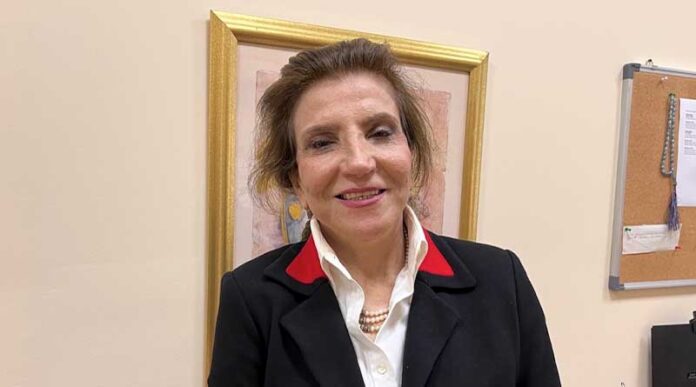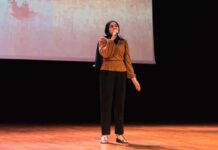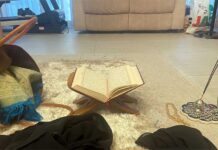By Malika Kaloo
“I have taught Arabic Studies for over thirty years now but my passion for teaching is no less than when I taught it for the first time,” says Dr. Ronak Husni, professor of Arabic and Islamic Studies at the American University of Sharjah.
Husni was born in the north of Iraq in Erbil to parents of mixed ethnic backgrounds. Her father was half Kurd and half Turk and her mother was half Kurd and half Arab.
Her personality mirrors her diverse cultural background.
“The language we spoke at home depended on who was visiting us. When my maternal grandparents visited us, we spoke in Arabic and if my father’s side visited, we spoke Kurdish to them,” she says.
Husni is fluent in five languages: Arabic, English, Farsi, Kurdish and Turkish. Yet more than any other language she knew, she has always loved Arabic.
As a child, books were her dearest companions, especially the ones on Arabic poems and prose.
“We were very close to my mother and she instilled in us a love for books and education,” she says.
To fulfil her mother’s dream, Professor Husni pursued higher education instead of following her father’s footsteps into business.
After completing her secondary schooling, Husni went to the University of Mosul in Iraq to finish her bachelor’s in Arabic Language and Literature. Later, she worked for three years as a teacher before pursuing her Ph.D. in Modern Arabic Literature at the University of St Andrews in the United Kingdom.
Husni was offered a scholarship for a master’s abroad but her supervisor advised her to pursue a Ph.D. Her scholarship covered part of the fees for her degree.
“I don’t like to be territorial in my mind.”
After completing her Ph.D. in the U.K., Professor Husni thought of going back to Iraq but destiny had something else in store for her.
“I even bought furniture, things for my home and shipped them to Iraq. Then suddenly things changed in the country and my family wrote to me saying that they were immigrating to Canada.”
Husni’s love for Arabic was profound even when she was a child. The sweetness of the language and the beauty of its script ingrained in her the passion to write poetry in secondary school. However, owing to her shy nature, she never recited her poems. In university, she would read her work from behind a curtain during events.
“I was afraid of criticism,” she says.
At that time, Husni says, she was an introvert who could not face the crowd.
The professor believes that the biggest transformation in her life took place when she started teaching. She came out of the shell of lack of confidence when she discovered her love for teaching Arabic language and literature to young students at various schools in Erbil.
“I was gradually gaining confidence and I owe this to my students, and love of teaching,” she says.
“I just struck a chord with the students,” she adds.
While pursuing her Ph.D. at St Andrews in the UK, Husni worked as a part-time teacher of Arabic language to non-native speakers in the same university. A year later, she received a job offer at the University of Durham where she worked for almost 18 years.
“When it was my last year of Ph.D. at St Andrews, I met a post-doc from Morocco and after a while, we got married. In fact, by the time I was in Durham, I had a son and I had to commute between Scotland and England before finally settling in Durham,” says Husni.
After 18 years at Durham, she went on to teach translation studies to masters and Ph.D. students at Heriot-Watt University in Edinburgh for three years before she was asked to become head of the Department of Arabic and Translation Studies at AUS in 2010.
“I was feeling nostalgia for the Middle East, for my culture. This is something most people will tell you that when they live in the West for a long period of time; they yearn for their culture, their language and their people,” she says.
“The more you discuss things with yourself, the more your mind flourishes.”
Husni served as Head of the Department of Arabic and Translation Studies at AUS from 2010 until 2016. Then she went back to teaching as a full-time professor of Arabic Heritage, Translation Studies, Modern Arabic Poetry and Prose and Andalusian Symbiosis.
She has written extensively on Translation Studies, Modern Arabic Literature, Women Studies and has co-authored other papers with her former colleagues in the UK. Husni is currently working on two projects, one of which is a book on translation and annotations of Tunisian poet Abul Qasim Abū al-Qāsim al-Shābbī’s highly acclaimed book “al-Khayāl al-Shiʿrī ʿInda al-ʿArab” (Arab Poetic Imagination).
“This book was never translated because the author never mentioned the sources of the poems/writings used in his book. The most interesting thing about this poet was that he died at the age of 25 years,” says Husni with utmost passion in her voice.
Another project focuses on famous Iraqi poet-critic Nazik al-Malai’ka, a romantic poet who later turned to nationalism and religion.
Despite having a long list of accomplishments, for Husni, the biggest achievement is seeing her children excel in education.
“Seeing my children happy and finding their paths in life is what means the most to me,” she says.
Husni’s journey from being a shy girl who was afraid of reciting her poetry to being a confident professor of Arabic at various leading universities is an inspiration for all those struggling with self-esteem.
“Now I realize that confidence comes from within. Today, I am completely opposite of what I used to be as a teenager. I am much more confident and an extrovert and all thanks to my passion for teaching.”


















